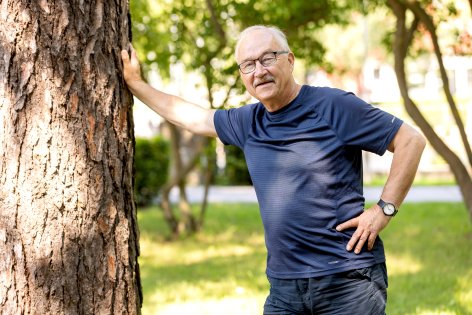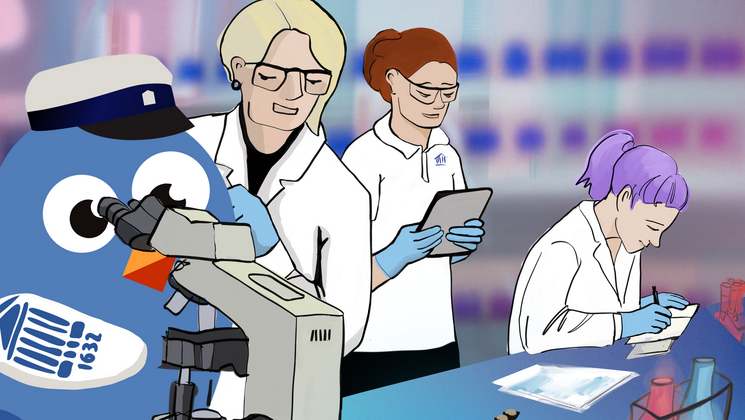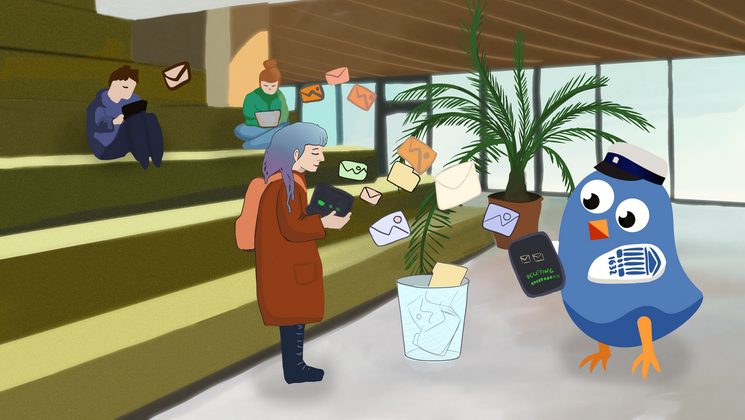-
Faculty of Arts and HumanitiesDean's Office, Faculty of Arts and HumanitiesJakobi 2, r 116-121 51005 Tartu linn, Tartu linn, Tartumaa EST0Institute of History and ArchaeologyJakobi 2 51005 Tartu linn, Tartu linn, Tartumaa EST0Institute of Estonian and General LinguisticsJakobi 2, IV korrus 51005 Tartu linn, Tartu linn, Tartumaa EST0Institute of Philosophy and SemioticsJakobi 2, III korrus, ruumid 302-337 51005 Tartu linn, Tartu linn, Tartumaa EST0Institute of Cultural ResearchÜlikooli 16 51003 Tartu linn, Tartu linn, Tartumaa EST0Institute of Foreign Languages and CulturesLossi 3 51003 Tartu linn, Tartu linn, Tartumaa EST0School of Theology and Religious StudiesÜlikooli 18 50090 Tartu linn, Tartu linn, Tartumaa EST0Viljandi Culture AcademyPosti 1 71004 Viljandi linn, Viljandimaa EST0Professors emeriti, Faculty of Arts and Humanities0Associate Professors emeriti, Faculty of Arts and Humanities0Faculty of Social SciencesDean's Office, Faculty of Social SciencesLossi 36 51003 Tartu linn, Tartu linn, Tartumaa EST0Institute of EducationJakobi 5 51005 Tartu linn, Tartu linn, Tartumaa EST0Johan Skytte Institute of Political StudiesLossi 36, ruum 301 51003 Tartu linn, Tartu linn, Tartumaa EST0School of Economics and Business AdministrationNarva mnt 18 51009 Tartu linn, Tartu linn, Tartumaa EST0Institute of PsychologyNäituse 2 50409 Tartu linn, Tartu linn, Tartumaa EST0School of LawNäituse 20 - 324 50409 Tartu linn, Tartu linn, Tartumaa EST0Institute of Social StudiesLossi 36 51003 Tartu linn, Tartu linn, Tartumaa EST0Narva CollegeRaekoja plats 2 20307 Narva linn, Ida-Virumaa EST0Pärnu CollegeRingi 35 80012 Pärnu linn, Pärnu linn, Pärnumaa EST0Professors emeriti, Faculty of Social Sciences0Associate Professors emeriti, Faculty of Social Sciences0Faculty of MedicineDean's Office, Faculty of MedicineRavila 19 50411 Tartu linn, Tartu linn, Tartumaa ESTInstitute of Biomedicine and Translational MedicineBiomeedikum, Ravila 19 50411 Tartu linn, Tartu linn, Tartumaa ESTInstitute of PharmacyNooruse 1 50411 Tartu linn, Tartu linn, Tartumaa ESTInstitute of DentistryL. Puusepa 1a 50406 Tartu linn, Tartu linn, Tartumaa ESTInstitute of Clinical MedicineL. Puusepa 8 50406 Tartu linn, Tartu linn, Tartumaa ESTInstitute of Family Medicine and Public HealthRavila 19 50411 Tartu linn, Tartu linn, Tartumaa ESTInstitute of Sport Sciences and PhysiotherapyUjula 4 51008 Tartu linn, Tartu linn, Tartumaa ESTProfessors emeriti, Faculty of Medicine0Associate Professors emeriti, Faculty of Medicine0Faculty of Science and TechnologyDean's Office, Faculty of Science and TechnologyVanemuise 46 - 208 51003 Tartu linn, Tartu linn, Tartumaa ESTInstitute of Computer ScienceNarva mnt 18 51009 Tartu linn, Tartu linn, Tartumaa ESTInstitute of GenomicsRiia 23b/2 51010 Tartu linn, Tartu linn, Tartumaa ESTEstonian Marine Institute0Institute of PhysicsInstitute of ChemistryRavila 14a 50411 Tartu linn, Tartu linn, Tartumaa EST0Institute of Mathematics and StatisticsNarva mnt 18 51009 Tartu linn, Tartu linn, Tartumaa EST0Institute of Molecular and Cell BiologyRiia 23, 23b - 134 51010 Tartu linn, Tartu linn, Tartumaa ESTTartu ObservatoryObservatooriumi 1 61602 Tõravere alevik, Nõo vald, Tartumaa EST0Institute of TechnologyNooruse 1 50411 Tartu linn, Tartu linn, Tartumaa ESTInstitute of Ecology and Earth SciencesJ. Liivi tn 2 50409 Tartu linn, Tartu linn, Tartumaa ESTProfessors emeriti, Faculty of Science and Technology0Associate Professors emeriti, Faculty of Science and Technology0Institute of BioengineeringArea of Academic SecretaryHuman Resources OfficeUppsala 6, Lossi 36 51003 Tartu linn, Tartu linn, Tartumaa EST0Area of Head of FinanceFinance Office0Area of Director of AdministrationInformation Technology Office0Administrative OfficeÜlikooli 17 (III korrus) 51005 Tartu linn, Tartu linn, Tartumaa EST0Estates Office0Marketing and Communication OfficeÜlikooli 18, ruumid 102, 104, 209, 210 50090 Tartu linn, Tartu linn, Tartumaa EST0Area of RectorRector's Strategy OfficeInternal Audit OfficeArea of Vice Rector for Academic AffairsOffice of Academic AffairsUniversity of Tartu Youth AcademyUppsala 10 51003 Tartu linn, Tartu linn, Tartumaa EST0Student Union OfficeÜlikooli 18b 51005 Tartu linn, Tartu linn, Tartumaa EST0Centre for Learning and TeachingArea of Vice Rector for ResearchUniversity of Tartu LibraryW. Struve 1 50091 Tartu linn, Tartu linn, Tartumaa EST0Grant OfficeArea of Vice Rector for DevelopmentCentre for Entrepreneurship and InnovationNarva mnt 18 51009 Tartu linn, Tartu linn, Tartumaa EST0University of Tartu Natural History Museum and Botanical GardenVanemuise 46 51003 Tartu linn, Tartu linn, Tartumaa EST0International Cooperation and Protocol Office0University of Tartu MuseumLossi 25 51003 Tartu linn, Tartu linn, Tartumaa EST0
University of Tartu researcher received Europe’s most prestigious research grant to study the formation, cycle and effect of laughing gas emitted from peat soils

Ülo Mander, Professor of Physical Geography and Landscape Ecology at the University of Tartu, received the Advanced Grant from the European Research Council to study the cycle of nitrous oxide (N2O), commonly known as the laughing gas, in fens and peatlands, its links to global climate change, and possible land-use practices that could help curb the production of this greenhouse gas in the future.
Laughing gas is one of the most dangerous greenhouse gases produced by microbial life in the soils of agricultural areas and drained peatlands. Reaching the stratosphere, it destroys the ozone layer that protects the Earth from UV radiation. It is estimated to account for 6% of the greenhouse gas impact on climate. However, this share is increasing due to changes in land use and the effects of the increasing use of fertilisers in agriculture. It is, therefore, a crucial factor in the element cycle in nature, having a long-term impact on the planet and humanity, but much is still unknown about its formation, cycle and processes of impact.
Ülo Mander and his research team at the Institute of Ecology and Earth Sciences have, for many years, studied the formation and binding of the laughing gas in the fens and drained peatlands of Estonia and the world. Their work has yielded valuable background knowledge to rely on when moving forward with this topic. The recently funded five-year research project will look into the cycle of laughing gas in three tropical wetland areas that, based on monitoring data, are N2O emissions hotspots: the northern part of Borneo Island in Malaysia, the Amazon lowlands in Peru and the world’s largest tropical wetland area in the Congo Basin, where the nitrogen cycle has not yet been studied in detail by scientists.

“There was a massive drainage of wetlands in Borneo a few decades ago to create oil palm plantations. As palm trees grow on peatland, which in turn is fertilised with nitrogen fertilisers, the world’s highest laughing gas emissions are currently measured there. In the research area in Peru, we have previously investigated the processes in natural palm swamps and areas of self-forested former agricultural land. It is an area where rapid forest growth helps to offset N2O emissions and gives hope that recovery is possible,” Mander explained the choice of sites for the project. As peatlands cover 3–4% of the land surface but store a third of all the carbon and nearly a fifth of all the nitrogen on Earth, they are critical ecosystems on the global scale.
In addition to measuring the N2O emissions from peat soils, the researchers are also interested in the role that tree trunks and crowns of peatland forests play in the cycle of the gas. The measurement devices in Borneo and Peru will be placed above tree crowns to study it. “We want to investigate what is happening in the tropical trees’ foliage that is rich in various algae, mosses, lichens and microbes and can capture some of the gases from the air and produce certain greenhouse gases to the atmosphere,” said Mander.
Incorporating the obtained data into existing N2O cycle models will also enable the researchers to assess the effects of climate change on the nitrogen cycle, predict emission peaks, propose improvements to the data underlying the International Panel on Climate Change (IPCC) reports, and adjust land-use strategies and future scenarios based on them. According to Mander, these strategies have so far been based primarily on the climate impacts of human-induced land use, but climate change has also had a significant effect on the cycles in natural ecosystems. The data on N2O emissions to be collected in the project led by Mander will be a valuable contribution to filling this gap.
The Advanced Grant received from the European Research Council is nearly €3.5 million. The grant is intended for leading top scientists who have achieved outstanding research results over the last ten years. The grant proposal was prepared with the help of the grant writing team of the University of Tartu’s Grant Office.
Read more similar news






